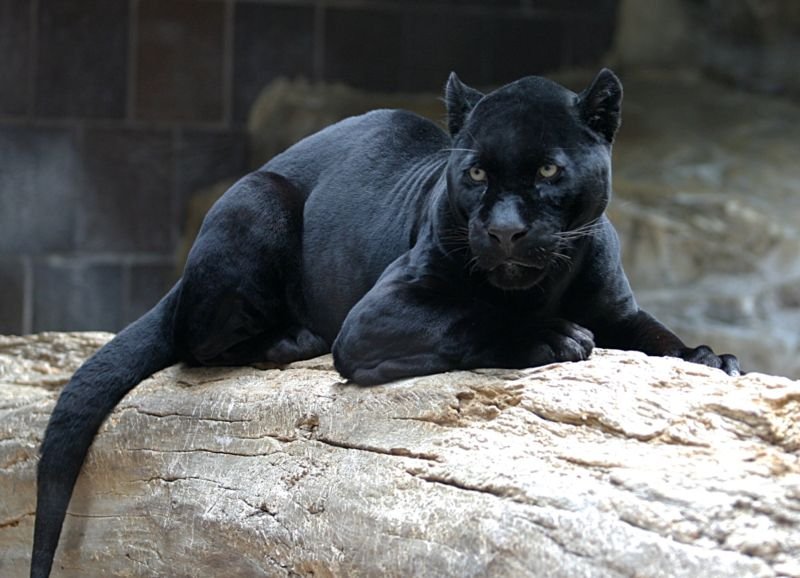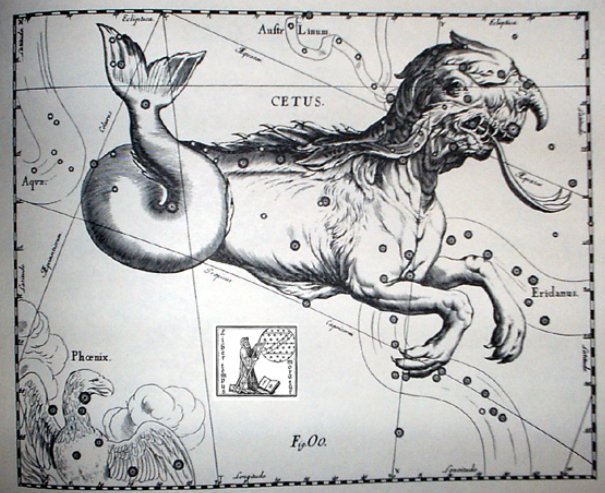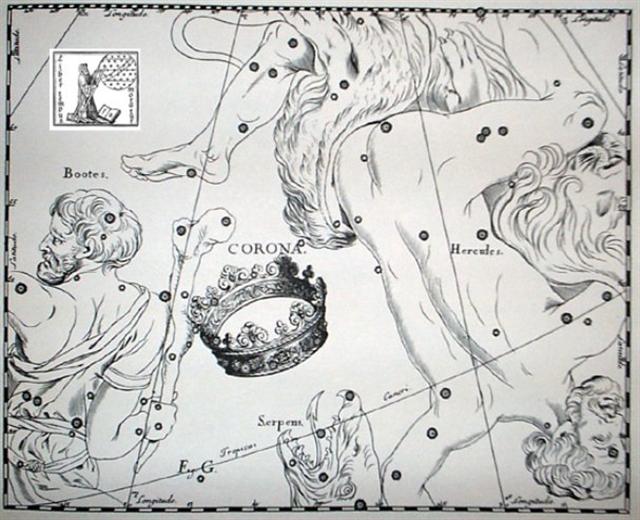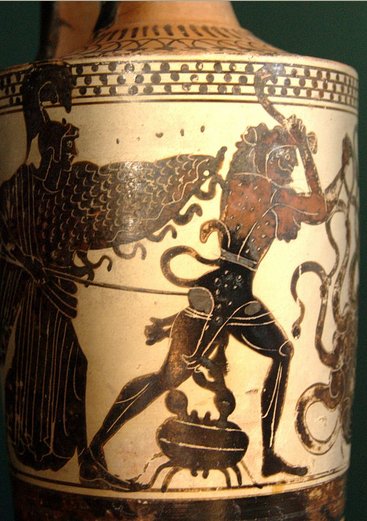12-2. The G text has clearly
underlined a kind of inversion half a year away from the Archer.
...
Nash (*273) - Menkar (*44) = *229
→
Alrami (*293), the
Archer, at the
end of
side a on the G tablet.
|
MAY 3 (123) |
4 (44 + 60) |
5 (125) |
6 |
7 (127) |
 |
 |
 |
 |
 |
|
Ga2-13 |
Ga2-14 (44) |
Ga2-15 |
Ga2-16 |
Ga2-17 |
|
July 6 (*107) |
7 (*108) |
8 (*293 -
*184) |
9 (190) |
10 |
|
"May 26 (123
+ 23) |
27 |
28 (148) |
29 |
30 |
|
WEZEN (Weight) =
δ
Canis Majoris
(107.1),
τ
Gemini (107.7),
δ
Monocerotis (107.9) |
No star listed (108) |
λ Gemini (109.4),
WASAT (Middle) = δ Gemini (109.8)
*68.0 = *109.4 - *41.4 |
No star listed (110) |
ALUDRA (Virgin) =
η
Canis Majoris
(111.1),
PROPUS
= ι Gemini (111.4),
GOMEISA (Water-eyed) = β Canis Minoris
(111.6)
*70.0 = *111.4 - *41.4 |
|
... The
jaguar learned from the grasshopper that the
toad and the rabbit had
stolen its fire while it was out hunting,
and that they had taken it across the river.
While the jaguar was weeping at this, an
anteater came along, and the jaguar suggested
that they should have an excretory competition.
The anteater, however, appropriated the
excrement containing raw meat and made the
jaguar believe that its own excretions consisted
entirely of ants. In order to even things out,
the jaguar invited the
anteater to a juggling
contest, using their eyes removed from the
sockets: the anteater's eyes fell back into
place, but the jaguar's remained hanging at the
top of a tree, and so it became blind. At the
request of the anteater, the macuco bird made
the jaguar new eyes out of water, and these
allowed it to see in the dark. Since that time
the jaguar only goes out at night. Having lost
fire, it eats meat raw. It never attacks the
macuco ...
 |
In July the Sun was no longer steadily rising higher and higher in the
sky.
... Midsummer is the flowering season of the oak, which is the
tree of endurance and triumph, and like the ash is said to
'court the lightning flash'. Its roots are believed to extend as
deep underground as its branches rise in the air - Virgil
mentions this - which makes it emblematic of a god whose law
runs both in Heaven and in the Underworld ... The month, which
takes its name from Juppiter the oak-god, begins on June 10th
and ends of July 7th. Midway comes St. John's Day, June 24th,
the day on which the oak-king was sacrificially burned alive.
The Celtic year was divided into two halves with the second half
beginning in July, apparently after a seven-day wake, or funeral
feast, in the oak-king's honour ...

Half a
year before NOVEMBER 10 (314) was MAY 10 (130):
|
MAY 8 |
9 |
10 (314 - 184) |
11 |
12 (132) |
13 |
 |
 |
 |
 |
 |
 |
|
Ga2-18 |
Ga2-19 |
Ga2-20 (50) |
Ga2-21 |
Ga2-22 |
Ga2-23 |
|
July 11 |
CASTOR |
13 |
14 |
POLLUX |
16 |
From May 4 (124) to MAY 4 at Ga2-14 there were *108 - *44 =
*64 precessional days. And since the time of Bharani the star at
the middle (Wasat) had glided ahead in the year with
*64 - *23 = *41 right ascension days.
In December 21 (355 = 314 + 41) the Full Moon should ideally
be visible at right ascension line *92 (→
355 - 183 - 80).
Similarly the Nose of Cetus should ideally be culminating at
the right ascension line *275 (→
*92 + *183) in June 21:
|
Solstice (172 +
183) |
Dec 22 (356 = 336
+ 20) |
|
 |
 |
|
Eb3-7 |
Eb3-8 (77, 403) |
|
vai oka hia |
kua oo te tere o te vaka - ko te maro o te vaka |
|
Oka.
1. Lever, pole; to dig holes in the
ground with a sharpened stick, as was done in
ancient times to plant vegetables; used generally in
the meaning of making plantations. 2. The four
sideways poles supporting a hare paega.
Okaoka, to jab, to pierce, to prick repeatedly.
Vanaga. Digging stick, stake, joist; to prick, to
pierce, to stick a thing into, to drive into, to
slaughter, to assassinate; kona oka kai,
plantation; pahu oka, a drawer. Okaoka,
a fork, to prick, to dig. Okahia, to prick.
Churchill. |
|
ι Pavonis (275.1),
POLIS = μ Sagittarii
(275.9)
MENKAR (α Ceti) |
η Sagittarii (276.9) |
 |
|
VISIBLE CLOSE TO THE FULL MOON: |
 |
|
ξ Orionis
(92.5) |
Al Han'ah-4
(Brand)
/
Maru-sha-pu-u-mash-mashu-7 (Front of the Mouth of
the Twins)
TEJAT PRIOR =
η
Gemini
(93.4),
γ
Monocerotis (93.5),
κ
Aurigae (93.6),
κ Columbae (93.8)
*52.0 = *93.4 - *41.4 |
|
Solstice (108 +
64 = 172) |
June 22 |
|
APRIL 18 (108) |
19 (*29 = *213 - *184) |
From the June solstice to heliacal Sirius there were 9 days
→ presumably to be
compared to 9 Rivers (μ Herculis), which rose with
Apollyon and the Sun in December 14.
|
Dec 23 (314 / 2) |
24 |
25 |
26 (360) |
 |
 |
 |
 |
|
Eb3-9 |
Eb3-10 |
Eb3-11 (80) |
Eb3-12 |
|
e
tagata aro ki te rima |
tarai
hia te vae o te
vaka |
te
ragi |
rima
hakarava hia |
|
Aro. Face, front, side (of a figure); ki
te aro o ..., to the front of ... Vanaga. Presence, body,
frontispiece; ki te aro, face to face. P Pau.: aroga,
the visage; ki te aroga, opposite. Mgv.: aro,
presence, before; i te aro, in the presence of. Mq.: aó,
face, in the presence of, before. Ta.: aro, face, front,
presence, view. It is probable that more than one word is confounded
in alo. The significations which appear in Southeast
Polynesia are most likely derived from a Tongafiti alo and do
not appear in Nuclear Polynesia. The alo belly and alo
chief which do occur in Nuclear Polynesia are also probably
Tongafiti, for in Samoa and Tonga they are honorific and applied
only to folk of rank, a good indication of borrowing by the
Proto-Samoans from Tongafiti masters. Churchill. In the Hawaiian
group, the western portion or side of an island was called 'the
front', ke alo, of the land, and the eastern side was called
'the back', ke kua. The reason of such designations must be
sought in the fact of the arrival of the inhabitants from the west.
Fornander.
Tarai. 1.
Deluge, sound of water; ua tarai, a smart shower. 2.
To carve, to square, to rough-hew, to shape; taraia,
rough-hewn. P Pau.: tarai, to cut, to hew, to carve. Mgv.:
tarai, to rough-hew, to carve. Mq.: taái, to cut, to
rough-hew, to work wood or stone. Ta.: tarai, to cut, to
fashion. Churchill. Sa.: talai, to adze. To.: talai,
to smooth off rough edges. Fu.: talai, to cut off knots or
thorns ... Churchill 2. |
|
FURUD = ζ Canis Majoris
(94.9) |
Well-22 (Tapir)
/
Arkū-sha-pu-u-mash-mashu-8
(Back of the Mouth of the Twins)
δ
Columbae (95.2),
TEJAT
POSTERIOR = μ
Gemini, MIRZAM (The Roarer) =
β
Canis Majoris (95.4),
CANOPUS
(Canopy) = α
Carinae
(95.6),
ε
Monocerotis (95.7),
ψ1
Aurigae (95.9)
*54.0 = *95.4 - *41.4 |
No
star listed (96) |
β
Monocerotis, ν Gemini (97.0) |
|
June 23 |
24 (175) |
25 |
26 |
|
Dec 27 |
28 |
29 |
30 (364) |
 |
 |
 |
 |
|
Eb3-13 |
Eb3-14 |
Eb3-15 |
Eb3-16 (85) |
|
kua tua te vaivai |
rima |
kua tuo te tino |
te
rima - te kihikihi |
|
Vaivai,
weak. PS Mq.: vaivai,
soft, pleasant, agreeable. Sa., To.:
vaivai, weak. Pau.:
Hakavaivai, to delay. Ta.:
vaivai, to rest a bit. Mq.: vaivai, to dilute,
to thin. Ha.: waliwali, soft, pasty. Churchill.
Tuo.
Mgv.: tuo, to speak long without an answer. Ta.: tuo,
to cry out loudly. Ha.: kuo, to cry with a loud voice.
Churchill.
Tino. 1.
Belly (as reported by a Spaniard in 1770). 2. Genitalia (modern
usage). 3. Trunk (of a tree), keel (of a boat); tino maîka,
banana trunk; tino vaka, keel. Vanaga. Body, matter; mea
tino, material; tino kore, incorporeal. P Pau.: tino,
a matter, a subject. Mgv.: tino, the body, trunk. Mq.:
tino, nino, the body. Ta.: tino, id. Churchill. |
|
No
star listed (98) |
Aurigae (99.4), ψ2 Aurigae (99.5)
GEMMA (α
Cor. Bor.) |
ψ4
Aurigae (100.5),
MEBSUTA (Outstretched) = ε Gemini
(100.7) |
SIRIUS = α Canis
Majoris
(101.2), ψ5 Aurigae
(101.4), ν Gemini (101.6), ψ6 Aurigae (101.7)
*60.0 = *101.4 - *41.4 |
|
... In other words, the ancient
Druidic religion based on the oak-cult will be swept away by
Christianity and the door - the god Llyr
- will languish forgotten in the Castle of Arianrhod, the Corona
Borealis. This helps us to understand the relationship at Rome
of Janus and the White Goddess Cardea who is ... the Goddess of
Hinges who came to Rome from Alba Longa. She was the hinge on which
the year swung - the ancient Latin, not the Etruscan year - and her
importance as such is recorded in the Latin adjective cardinalis
- as we say in English 'of cardinal importance - which was also
applied to the four main winds; for winds were considered as under
the sole direction of the Great Goddess until Classical times
...
 |
|
June 27 |
28 |
29 |
30
(181) |
But from Agasthya (Canopus) to
Sirius at the Full Moon in day 364 there were
6 'sleeping mats'.

|














